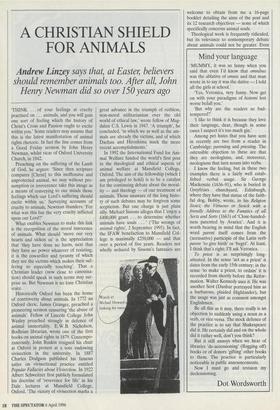Mind your language
`MUMMY, it was so funny when you said that even I'd know that omnibus was the ablative of omnis and that man wrote in to say it was the dative — I told all the girls at school.'
`Yes, Veronica, very funny. Now get on with your paradigms of histemi lest worse befall you.'
`But why are the readers so bad- tempered?'
`I like to think it is because they love their language, dear, though in some cases I suspect it's too much gin.'
Among pet hates that you have sent in recently are two from a reader in Cambridge: parenting and priesting. The ostensible objection to these are that they are neologisms, and, moreover, neologisms that turn nouns into verbs.
I know the feeling, but in these two examples there is a fairly well estab- lished verbal usage. Sir George Mackenzie (1636-91), who is buried in Greyfriars churchyard, Edinburgh, where they have that statue of the faith- ful dog, Bobby, wrote, in his Religion Stoici; the Virtuoso or Stoick with a friendly Address to the Fanatics of all Sects and Sorts (1663) of 'Close-handed- ness parented by Avarice'. And it is worth bearing in mind that the English word parent itself comes from the (accusative) participle of the Latin verb parere `to give birth' or 'beget'. At least, I think that's right; I'll ask Veronica.
To priest is as surprisingly long- attested. In the sense 'act as a priest' it dates from the early 15th century; in the sense `to make a priest, to ordain' it is recorded from shortly before the Refor- mation. Walter Kennedy uses it. He was another Scot (Dunbar portrayed him as a barbarous, plaided Highlander), but the usage was just as common amongst Englishmen.
Be all this as it may, there really is an objection to suddenly using a noun as a verb, or vice versa. The stock defence of the practice is to say that Shakespeare did it. He certainly did and on the whole did it rather well, don't you think?
But it still annoys when we hear of libraries 'de-accessioning' (flogging off) books or of donors 'gifting' other books to them. The practice is particularly noticeable in public announcements.
Now I must go and revision my declensioning.
Dot Wordsworth


























































 Previous page
Previous page